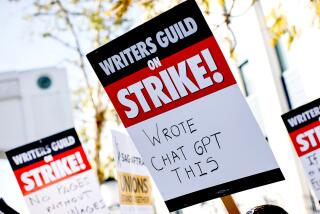L.A.âs mayoral rivals walk fine line in dealing with labor
For months, the top two candidates in the Los Angeles mayoral campaign have bombarded the public with competing claims that each of them is best-suited to get City Hallâs financial affairs in order.
With a new round of labor talks awaiting the next mayor, a critical question for voters is this: which candidate would be best positioned to negotiate pay and benefit packages with city employees that the public can afford?
City Councilman Eric Garcetti and City Controller Wendy Greuel are both Democrats with long histories of supporting organized labor. But in the topsy-turvy days since they emerged as finalists from the March 5 primary election, the competition for labor support has upended conventional thinking about the candidates.
FULL COVERAGE: L.A.âs race for mayor
Greuel, who has tried to nurture a reputation as a tough, waste-busting fiscal manager, has sent mixed signals about whether she would undermine a pivotal measure that rolled back pension benefits for future employees. And Garcetti, a city councilman, has risked his image as a labor-friendly progressive by attacking the huge sums being spent by a key city employee union on Greuelâs behalf.
The result is a political dynamic few analysts would have foreseen prior to the race: Greuel emerged as the de facto labor candidate after criticizing cost-cutting moves backed by Garcetti and the council: layoffs, furloughs and a hike in the retirement age for new workers. And despite backing from unions representing grocery clerks, longshore workers, teachers and airport police, Garcetti has been painted by powerful labor leaders as a union nemesis.
âItâs becoming a little bizarre,â said longtime City Hall lobbyist Steve Afriat, âbecause sheâs becoming the left candidate and Ericâs becoming the right candidate, which nobody would have predicted a year ago.â
L.A. ELECTIONS 2013: Sign up for our email newsletter
The candidates have tread carefully to maintain laborâs favor, while signaling to voters they represent much broader interests. Garcetti on Wednesday announced the support of businessman Steve Soboroff, a mayoral contender in 2001. Greuel, in turn, signed up Richard Riordan, the former Republican mayor, as an advisor. Greuelâs campaign also said she would explore increasing the retirement age for existing city workers â an idea generally opposed by city unions.
The campaign leading up to the May 21 runoff election would have featured much more dramatic contrasts if Republican lawyer Kevin James had made it past the first round. He finished third.
The distinctions between the two remaining candidates on labor-management issues are considerably more subtle.
Greuel has hammered Garcetti over his council vote to cut pension benefits for future hires without engaging in collective bargaining. That helped her lock down the endorsement this week of the countyâs 600,000-member umbrella labor organization. She also signaled she would reopen negotiations on pensions, though she later backtracked to say she only wants informal talks to prevent a lawsuit.
The two-step on pensions troubled some supporters, who feared she might backpedal on cuts designed to save $4 billion over 30 years. The Los Angeles Area Chamber of Commerce, a Greuel backer, met with her Thursday to gain assurances that she hadnât drifted away from its pension-reform agenda.
Garcetti, for his part, has campaigned as someone who as a city councilman made tough budget decisions, including raising the retirement age for future civilian employees from 55 to 65. But budget watchers inside City Hall fear that Garcetti will be too timid to stand firm, if necessary, against longtime labor allies as mayor.
During a dozen years in office, Garcetti dependably backed organized labor as it pushed such initiatives as a living-wage requirement for hotels near LAX, limits on Wal-Mart superstores and unionization of car wash workers.
City employee groups spent weeks during the primary promoting Greuel and pummeling Garcetti on the airwaves. But he criticized only one by name: the union representing Department of Water and Power workers, which donated heavily to a $2-million advertising effort on Greuelâs behalf.
Asked if he sees city employee unions as a special interest, Garcetti said he is ânever going to demonize people who serve the public.â
âIâve always worked well and have always had a tremendous amount of respect for our city workers who deliver the services that we do,â he added. âThatâs the critical piece to underline.â
That argument has failed to mollify his newfound union critics. Garcetti has been using âcode language to stifle working peopleâs right to organize,â declared a flier passed out at a recent county labor federation endorsement meeting.
âSome of his statements have not been, how do I say, favorable or flattering about the unions,â said Alice Goff, president of the union that represents clerks at City Hall. âHe sought the endorsement of labor â and sought [it] vigorously. So itâs almost a contradictory position.â
Greuel, meanwhile, has been trying to assuage business leaders. After Thursdayâs meeting with Greuel, Chamber of Commerce President Gary Toebben said she reassured him that she would press for new reductions in pension costs.
One distinction between the candidates has appeared in recent weeks.
Garcetti said city officials do not have to negotiate with unions to change the pay and benefits of future employees. Greuel adheres to laborâs view, that even contract changes for employees not yet on the payroll must be subjected to formal negotiations.
But after many media interviews, even this point of apparent separation seemed to shrink away. Greuel said she would talk informally to unions about the pension reductions for new employees. Garcetti had previously said he, too, would be open to conversations about alternatives â if the employees could identify other savings of equal value.
Miguel Santana, the cityâs top budget officer, said civilian employees would not budge on pension reductions after more than a dozen meetings over two years. Before the City Council voted last fall to proceed unilaterally with the retirement rollbacks, budget officials â acting on directions from Garcetti and his colleagues â asked union officials, one last time, if there was any chance of reaching agreement on pension reductions.
âThe answer was no,â Santana said.
More to Read
Sign up for Essential California
The most important California stories and recommendations in your inbox every morning.
You may occasionally receive promotional content from the Los Angeles Times.












